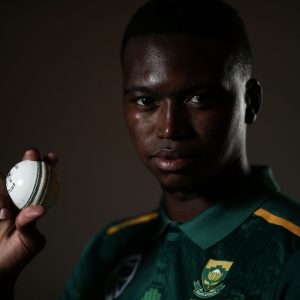Jonty Rhodes a ‘beneficiary of white privilege’
The former Protea ruffled feathers when he admitted his career would probably have been different but for apartheid. He explains the need for open conversations about white privilege.
Author:
5 December 2020

Privilege is quite a comfortable subject to broach with Jonty Rhodes, a cricketer who by his own admission has benefitted immensely from the opportunities afforded him by virtue of his skin colour.
Rhodes, who played 245 one-day internationals and 52 Test matches in 11 years of international cricket, has been privately examining his former life as a cricketer, and his current one as a coach, mentor and role model.
The former middle-order batsman and jack-in-the-box fielder can look back on a career that placed him at the heart of the Proteas’ successes and failures in the 1990s and early 2000s, but it’s a career he openly admits may never have happened, all things being equal. But all things were not and are not equal in South Africa, let alone its cricket.
“I certainly benefitted from the fact that I wasn’t really competing with 50% of the population,” Rhodes famously said in an interview while in India. “I literally was competing only with the white players,” he says.
Rhodes’ elevation to the Proteas in 1992 was never questioned by the mainstream media or analysts, though he was one of many white cricketers who were in the right place at the right time, or wrong place at the right time, depending on your historical outlook.
Domestic cricket in South Africa was deeply divided, painfully so, but to level the playing field and choose a side based purely on merit and stats seemed unpalatable for the then South African team selectors led by former national captain Peter van der Merwe.
Related article:
These were the days when white privilege went unspoken yet guided every piece of legislation and policy within South African sport and society. The suggestion of such privilege appears to strike fear into the hearts of some former players. It is the prick that threatens to deflate their bubble of invincibility and soil their perceived legacies.
For Rhodes, it is a thorny subject that should and must be touched on in South African cricket and indeed the country if it is to move forward, even if it causes pain. “It’s difficult for me to talk on behalf of other white guys. We grew up in similar backgrounds because of our race. Not everybody went to the same schools or had the same opportunities, but I just know from my perspective there’s a real concern that if you talk about white privilege that it’s still prevalent, that you’re acknowledging that you’re a racist, and I think that’s always a worry. I am a beneficiary of white privilege, and I still see it,” Rhodes admits.
Acknowledging Black Lives Matter
Though Rhodes was speaking before the furore over Proteas fast bowler Lungisani Ngidi’s comments on Black Lives Matter and the subsequent criticism he received from former national players Pat Symcox, Boeta Dippenaar, Rudi Steyn and Brian McMillan, his sentiments point out the insecurity wrapped in prejudice that has publicly surfaced among former white sportsmen who for years gorged themselves on the fruits of a segregated society.
“I think there’s a white concern that ‘we’ haven’t been in government for the last 20-odd years, so stop blaming white people. Some are saying, ‘We’re youngsters, we never even voted for the Nats [National Party]. We haven’t even grown up in an apartheid country.’ It’s almost as if we’re concerned about acknowledging the fact that says white privilege means that we’re still racist. I haven’t been dodging the question,” he says.
When Rhodes spoke openly in India about white privilege, he was attempting to highlight Cricket South Africa’s (CSA) poor transformation record during the Proteas’ series against England in the summer, when the national team was in a selection quandary. An out-of-form Temba Bavuma was dropped for the second Test after being ruled out of the first owing to injury, leaving Kagiso Rabada as the only African in the team. Like clockwork, criticism of the CSA’s transformation efforts became the target.
“I was interviewed in India, where I was doing most of my work, and I was at a conference and it came up. Temba had just been left out of the team. I spoke on behalf of myself and my experiences. When I worked for Standard Bank, I handled the sponsorship accounts, so I was very involved with Cricket South Africa, working with [then CSA chief executive] Gerald Majola and with the players like Graeme Smith.
Related article:
“I know a lot of money has been put into transformation, but where has it gone? I don’t know, because if you think of the number of players that have been produced in the system, is the system working? I don’t know enough about the system, the hubs, who’s doing what,” Rhodes says.
“I spoke to the Black African Cricket Clubs grouping and asked them, where do you think there should be a focus? And they said to me, a couple of years ago when Soweto had a really strong cricket fraternity, there were 60-odd coaches in Soweto. They said now they have six. Whatever Cricket South Africa has introduced, it’s just not working.
“How do you balance so many years of apartheid, how many generations? The World Economic Forum spoke about social upliftment and how long it takes for generations to rise out of that economic cycle, and it said nine generations. Nine. That’s a long time,” he adds.
India’s adopted son
At the age of 51, Rhodes is on a path of self-discovery, one that assumes the responsibility to give back to the game while acknowledging the injustices of the past from which he benefitted directly. There is the associated guilt of being white and male in a country that for decades has worshipped those attributes in a human being. And then there is the obligation to make a meaningful impact on the communities around him.
“I’ve been spending the last five years working out of the country for at least six months of the year. But my whole focus from a year ago was wanting to work more in South Africa and especially around grassroots and development,” he says. “I haven’t done IPL [Indian Premier League] for the last two seasons [before returning this year], but I’ve been to places like Malawi, Zimbabwe, Nepal twice, India, where there’s some fantastic cricketing facilities, and Sri Lanka, but focusing more on grassroots development of the game. There’s real passion and people play the game for the same reason I started playing as a kid.”
The former Proteas batsman’s relationship with cricketing powerhouse India has aged well enough to become a defining feature of his life and career, so much so that he named his daughter after the country, one of two of his children who were born in India.
Related article:
The relationship started on 8 March 1992, when Rhodes performed his now iconic diving run-out of Pakistan’s Inzamam-ul-Haq in Brisbane, Australia, during the 1992 World Cup. In the months leading up to the World Cup, Pakistan and India were at loggerheads over the disputed Kashmir region. Rhodes’ act of brilliance to scupper the old enemy endeared him to millions of Indians, securing a place in their hearts for decades to come.
“The India thing has been interesting. I go back to India a lot and I see guys like Brett Lee, at the time the world’s fastest bowler, and Adam Gilchrist, so guys who are slightly different, Indians really enjoy that. There’s some sort of appeal to that. My fielding was fairly unique at the time, which they just took to,” he says. “When I ran out Inzamam, Pakistan and India were about to shoot nuclear warheads at each other. I became this adopted son of India. But also, they’d never seen fielding like that before.”
There is a theory – and it’s only a theory – that again Rhodes’ privileged upbringing played a part in his trajectory in international cricket. “We had grown up diving around. I’m very fortunate to go to the school that I went to. I had grass in the back yard at home. We lived in a very small village, but we had space. It was a bit of a trek every day into town to go to school, but it gave us the opportunity to grow up with grass under our feet. If the ball passed us, we could slide or dive to catch a ball,” he says.
That mutual adoration between Rhodes and Indian cricket fans runs deep. His popularity has afforded him opportunities to coach and do motivational speaking in India, something he has learnt comes from a deep place.
“The reason I have this affinity with India is growing up as a white kid in apartheid South Africa, I played with white kids, I had friends who were only white kids, kids who I played against and with, up until university,” Rhodes says.
“The amazing thing about India is that parts of India within a state are so diverse. I really have, in the last nine seasons working in India, tried to get out as much as possible. Generally, as a player, you land, get out of the airport, the hotel, the cricket ground and you haven’t seen anything, or been able to adopt any of the culture, or even experience any of it. So I try now, I borrow a motorbike. The more you learn about other people, the more you learn about yourself.”



